A recent study by Oxford Economics says that Arkansas will lose $60.8 million in revenue from the hotel tax.
Bigger states have to expect bigger losses: $1.9 billion for California, while both New York and Florida may see losses of $1.3 billion.
The nation as a whole is looking at a loss of $16.8 billion.
How can taxes from a single industry have so much effect? In 2018, hotel taxes generated $40 billion in revenue for states. That’s just sales tax, not the property taxes that hotels also pay. Sales tax on occupancy, meals, and other sales, and gaming mount up. Over the past ten years, the industry as a whole has been on the rise. At the end of 2018, hotels supported 8.3 million American jobs.
Since COVID-19 caused lockdowns and travel bans, 70% of hotel workers have been on furlough or have simply lost their jobs. Hotels have closed and income from hotels has fallen from $660 billion per year to a fraction of that.
At the time of the study, 2020 was still on track to be the worst year ever recorded for the hotel industry. 60% of hotel rooms are empty.
The consequences
The drop in hotel tax revenue will hurt state and local governments. But a 100-room hotel, according to the American Hotel & Lodging Association, creates an additional $18.4 million in spending in the community where it is located. Restaurants, retailers, and tourist destinations all benefit from a full hotel. The sales tax on most of those expenditures will also be lost.
An estimated 20% of small businesses will close entirely because of the pandemic. Those that remain open are losing an estimated 30% of their revenue. The employees of businesses that have closed or laid off workers are also cutting their spending. Consumer spending overall fell by 13.6% in April. This is the worst drop recorded in 60 years. These figures are not just for businesses affected by hotel performance, but the percentages are likely to apply to all the businesses hit by hotel closures.
States are tightening their belts and hoping for more federal support. But many states are on the edge of economic disaster, scrambling for solutions.
We’re expecting two main attempts to solve the problem.
More audits
When times are tough, states are motivated to scrape all the nooks and crannies at the bottom of the barrel. Companies that might have felt — correctly — that they were too small to be worth auditing my soon find that this is no longer true.
Private audits are increasingly common. In these cases, private firms conduct the audits, earning a percentage of what they’re able to collect from taxpayers. Obviously, it’s in their best interests to be aggressive.
Raising sales tax rates during a harsh recession is obviously not politically popular. Auditing more allows states to squeeze out a few more dollars without taking that unpopular step.
Increase in sales tax rates for cities
It may not be popular to raise sales tax rates, but some cities may not feel that they have a choice. Cities have smaller budgets, to begin with, and only the largest cities are getting significant federal support for pandemic relief.
Cities also are less likely to have control over property and income taxes. Sales tax is the place to go if things get desperate. California coastal cities are raising their tax rates to as much as 8.75% in the face of “a sharp decrease in tourism.”
The hotel industry is hoping that the federal government will step in and help them out. But it is not just the hotel industry that will be affected by increases in audits and in city sales tax rates.
Fortunately, Sales Tax DataLINK provides sales tax solutions and full sales tax compliance services– your best defense against audits. We provide an exceptional level of accuracy, too, so you don’t end up paying more than you should, even if tax rates rise. Call us at (877) 806-7715 and get the details.




